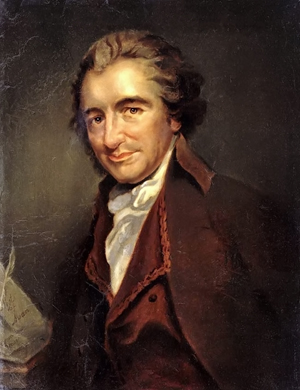Thomas Paine, 1737-1809

“Where liberty is not, there is mine.”
—Thomas Paine, replying to
Benjamin Franklin’s remark,
“Where liberty is, there is my country.”
Thomas Paine, one of the founding fathers of the United States, was born on January 29, 1737, in Thetford, England. He lived in England until age thirty-seven, working a variety of jobs, including as a corsetmaker, a privateer interrupting enemy trade, and a school teacher. In 1772 he participated in his first political venture, demanding better pay and working conditions for excise officers with the distribution of his pamphlet The Case of the Officers of Excise.
After Paine was fired from the excise service for being absent from his post without permission, a friend introduced him to Benjamin Franklin, who advised him to sail to the British colonies in America. He followed Franklin’s suggestion, arriving in Philadelphia in 1774, just before the fight for independence began. He would earn the title “Father of the American Revolution” with his infamous 1776 pamphlet Common Sense, which advocated for independence from Britain and claimed that “in America THE LAW IS KING.” It became a bestselling work, circulated to over 100,000 people and largely influenced the sentiments that led to the Revolutionary War.
Paine is most notorious for The Age of Reason, a deistic treatise that attacked institutionalized religion and the inerrancy of the Bible. It highlighted corruption in the Christian church, criticized the church’s attempt to gain political influence through religion, rejected the notion of miracles, and postulated that the Bible was just another literary work, as opposed to a divinely inspired text. One excerpt from the work, published in 1794 and 1795, reads:
Each of those churches show certain books, which they call revelation, or the word of God. The Jews say, that their word of God was given by God to Moses, face to face; the Christians say, that their word of God came by divine inspiration: and the Turks say, that their word of God (the Koran) was brought by an angel from Heaven. Each of those churches accuse the other of unbelief; and for my own part, I disbelieve them all.
Later, in the midst of the Second Great Awakening in America, Paine was intensely disliked by a very religious society. He was abandoned by friends and derided by so many people that, upon his death on
June 8, 1809, at the age of seventy-two, only six people were present at his funeral to mourn. A commonly reprinted obituary from the New York Citizen read: “He had lived long, did some good and much harm.”
Despite Paine’s alienation in his later years from the nation he helped inspire, he is still lauded—two hundred years after his death—as an intellectual hero among many freethinkers. The Age of Reason has and continues to inspire many writers, including Christopher Hitchens, in whom Paine’s ideas continue on. “It is necessary to the happiness of man, that he be mentally faithful to himself,” Paine wrote in The Age of Reason. “Infidelity does not consist in believing, or in disbelieving; it consists in professing to believe what he does not believe.”
